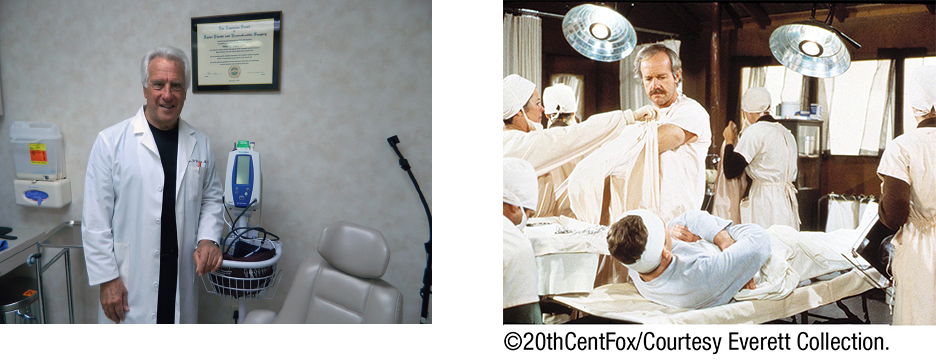Analyzing the Credit Roll
 FOLLOW YOUR PASSION
FOLLOW YOUR PASSION
In filmmaking, as in life, follow your passion. If you want to work in the movie industry, but cinematography, directing, editing, design, and so on, are not your thing, figure out what your passion is and how you might use it in the context of the industry. If you are passionate about food and cooking, for example, explore catering opportunities within the film industry.
As you evaluate what niche of the film business may best fit your interests and talents, keep in mind the gypsy nature of the industry—productions move from place to place depending on financial incentives and logistical and creative needs. That means those involved in the nuts-and-bolts of production are bound to be away from home a lot. It also means many folks in the industry are freelancers—they don’t work salaried 9-to-5 jobs and get regular paychecks, or even work 12 months a year, even at the industry’s highest levels.

Dr. Walter Dishell (left), a practicing ear, nose, and throat doctor in Los Angeles, has some 600 television credits, including his work as medical advisor on the TV show M*A*S*H (right).
And yet if you ever bother to sit through the final credits of a major motion picture, you will see hundreds of names scroll by—people doing all sorts of jobs in all sorts of categories just to get one major project onto the screen for your enjoyment. Are they all freelancers? Creative free spirits? Auteurs?
Hardly. Many of the people behind the names—most of which you would never recognize—hold steady jobs, or at least earn regular salaries within the motion picture industry by working in a host of support positions, in studio or production company jobs, or for outside entities or companies that contribute in particular ways to motion picture and other content creation. And they are all part of the larger film industry.
Here we give you our roster of some of the typical jobs you might see in the credit roll beyond the formal filmmaking positions you have already discovered in this book. And this is hardly a comprehensive list. Almost every movie will have variations in the credits and contributions that went into making that specific film. This list merely represents a healthy sampling to illustrate the difference between being a filmmaker and working in the film industry.
 EVALUATE THE CREDITS
EVALUATE THE CREDITS
View any major motion picture and carefully scroll through the end credits. Make note of some obscure, unusual, or unexpected job titles you see that have nothing directly to do with putting images or sound onto the screen. Then write a short essay about which jobs surprised you or were hard for you to connect to the feature film you just watched. Include a paragraph about which of those jobs you could see yourself possibly doing as a career, and how you might link it to your filmmaking training.
The list includes professionals from almost all walks of life, including accountants, bankers, lawyers, and paralegals; animal handlers and trainers; caterers; carpenters, construction, paint, and sculpting professionals; charitable-industry professionals; custodial service and waste-management experts; dialect coaches; doctors, nurses, chiropractors, emergency medical technicians (EMTs), and massage therapists; electricians and engineers; government lobbyists; hairdressers and makeup artists; helicopter pilots; insurance professionals; librarians; musicians; all kinds of personal assistants; public relations professionals; recycling and green-industry professionals; researchers, translators, and teachers; seamstresses and tailors; security guards; social media experts and web designers; still photographers, graphic designers, and videographers; travel agents; truck drivers, vehicle rental agents, and transportation coordinators; and weapons experts.
This is only a partial sampling of the possibilities, and as you probably noticed when scanning the list, virtually all of them are “real world” jobs that you could easily end up doing outside the film industry. Indeed, depending on your needs, passions, and desires, you might prefer a more stable life pursuing such careers to the unique, often transient, up-and-down life of filmmakers. You could also do them within the film industry, or do a combination of both. A catering company, for instance, may do a robust business outside the film industry but also service film or TV shoots when they come to town. Likewise, lawyers and accountants may have clients in many industries, with film-related clients representing a portion of these. Other professionals—such as makeup artists, animal handlers, and transportation coordinators—may work full time in industry service. But either way, if you are interested in pursuing any of these fields, or many others, by grounding yourself with a basic film education, you give yourself the opportunity to expand the horizons of these other careers, should you pursue them, by widening your pathway into the film industry, should that opportunity interest you and present itself.
But what is that pathway generally? How does one find a way into the industry and promote one’s work and capabilities in a field in which the term “wannabe” is often used with derision?